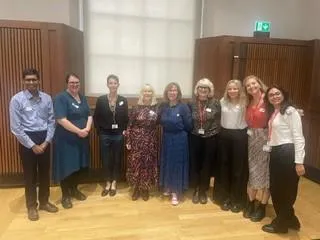Our innovative and groundbreaking study focused on services for a group of women whose voices are seldom heard, and we were delighted by the audience response to our revisioning of their care. Our findings, coproduced with stakeholders from health and social care and with women with lived experience, call for workforce training to affect cultural change, the development of advocacy and peer support services, the colocation and integration of services, and the routine provision of perinatal mental health support including for women who lose care of their babies. There was a real appetite amongst the practitioners, policy makers and clinicians who attended the Stepping Stones conference to translate these findings into practice.
Dr Polly Radcliffe, Senior Research Fellow, Department of Addictions Sciences, King’s IoPPN
30 September 2024
Experts come together to discuss findings from the Stepping Stones Study
Discussions at the event focused on how health and social care providers and services can best meet the needs of women who use drugs and the needs of their babies.

The perinatal period is a time when women who use drugs are often keen to engage with treatment and ante-natal services, yet health and social welfare outcomes are highly variable for this group both in the UK and internationally.
Health and social care practitioners, social care commissioners, policy makers, researchers and women with lived experience came together to hear leading experts share findings The Stepping Stones Study, which ran from October 2021 – April 2024, evaluating the different care models and pathways for pregnant women who use drugs, from early pregnancy to one year after the birth of their baby.
Funded by the NIHR, the study was led by Dr Polly Radcliffe, Senior Research Fellow, Addictions Department, IoPPN, King's College, London, and Professor Helen Cheyne, University of Stirling. It has been a collaboration between researchers at King’s College London, the Universities of Stirling and Huddersfield, and Homerton University Hospital.
Claudia Garcia Moreno from the World Health Organisation, and one of the keynote speakers of the day, shared thoughts on the accessibility of compassionate care which addresses the many needs of women using substances during their pregnancy. She commented on the intersectionality of poor mental health or intimate partner violence and substance use and emphasised that services need to be affordable, confidential and abide by human rights standards. The second keynote was delivered by Kirsty Kitchen from Birth Companions who spoke of the need for a radical shift in how we think about women in complex situations and discussed the benefits of hyper-specialised units, and the need for real societal attitude changes around this topic.
This event was a unique opportunity to explore and set a new practice and policy agenda for the care of this marginalised group of women in order to improve outcomes both for them and for their children.
Findings were shared from:
- Scoping review of UK best practice and clinical guidelines
- Systematic Review of psychosocial interventions for women who use and are in treatment for using drugs in the perinatal period
- Qualitative, longitudinal study of women's experiences and care pathways in four sites in Scotland and England
- Optimal Model of Care derived from our research findings and coproduced with our Expert Advisory and Coproduction Group
A panel discussion chaired by Professor Margaret Maxwell (University of Stirling) closed the day with Kirsty Kitchen of Birth Companions, Laura Seebohm, CEO of WWIN, Narendra Aladangady, Homerton Hospital and Sarah Acheson (Brighton City Council and Oasis). The discussion focused on the importance of the Stepping Stones work, the need to continue the conversation and for multiagency collaboration for the benefit of women and their children.


